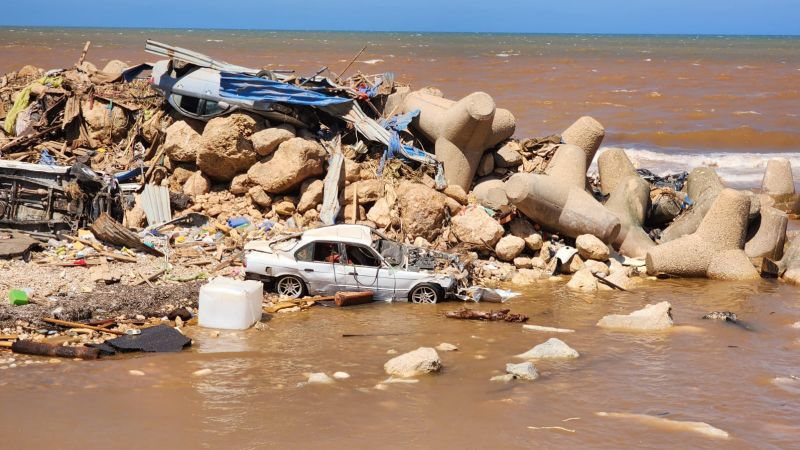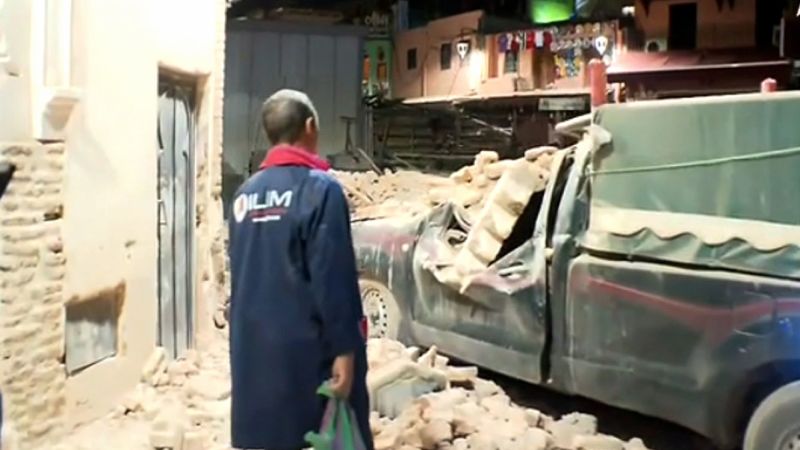"Catastrophic": doesn't have to primarily impact humans, but must semi-permanently change some part of the world as we know it.
"Cascading": must trigger secondary disaster(s) or have significant indirect effects.
"Natural": the inciting event is not directly done by human actions or technology (e.g., AI, nukes), but can be triggered by anthropogenic effects (e.g., climate change).
"Disaster": must have a primarily negative outcome (loss of life, ecological damage, societal collapse, etc.).
Examples that would qualify for YES:
Temperature anomaly in the antarctic causes shelf detachment and global sea level rises, causing mass population displacement.
Complete collapse of an ecosystem (acidification finishes Great Barrier Reef die out, geological disaster causes widespread Amazon Basin toxification, etc.).
Wildfires wipe out a major world city.
The Tohoku earthquake of 2011 that caused the nuclear plant disaster in Fukushima would qualify if it happened today.
Examples that WOULDN'T trigger a YES resolution:
AI wipes out all life
A volcano creates a new island
Orcas destroy all boat rudders on the planet
@Stralor , thanks for creating this question.
I think there is a load of similar or derivative questions that could be written on this area with more academic inspired criteria and details (I.e. to narrow down some more some of the definitions).
In the future, it might be useful in the discord and/or better yet as a bounties to crowdsource the criteria for difficult/laborious tasks, i.e. a comprehensive list of the last X cascading natural disasters starting backwards from a specific year to be used to help refine the resolution criteria. As for crowdsourcing relevant information in comments, I don’t know how difficult it would be to export detailed data (event trees and model data) from expert research to give more detail so participants can monitor ongoing events and update on the question more often.
Lacking scholarship and time I’ll leave that to others and just paste a couple of obvious search results I found relevant and interesting.
https://www.ncbi.nlm.nih.gov/pmc/articles/PMC10171413/
Great starting point I think.
https://www.weforum.org/publications/global-risks-report-2024/data-on-global-risk-perceptions-2024/
Click on “global risk landscape” at the top and then on the green dots (environmental disasters) so you can see what the cascades are thought to be.
@Eliza that's a large possibility space! have ideas in mind? in worst case scenarios, I could see failing infrastructure leading to famine, widespread disease, etc.
@Stralor I guess I am kind of asking about which portion of the cascade must be the 'natural disaster'
In your example of an earthquake leading to a nuclear plant disaster, the natural disaster part started it, and the subsequent effect was not itself 'caused by' a natural disaster.
In your example of a temperature anomaly, the temperature anomaly itself may not have been a 'natural disaster' but the sea level rise certainly would be.
So in this case, if the hurricane is the 'natural disaster' part, does a cascading effect need to be a second natural disaster? Or, for example, could "1000 people died and Acapulco turned out worse than New Orleans after Katrina" be the cascading effect?
@Eliza the initial event must be natural. temperature anomaly is not a disaster in itself (it seems I forgot to include potential cascading effects on that one, I've added them now).
"Natural": the inciting event is not directly done by human actions or technology (e.g., AI, nukes), but can be triggered by anthropogenic effects (e.g., climate change).
the cascading effect must more or less be a secondary disaster. deaths by hurricane are not secondary, but widespread sickness due to contaminated ground water post-hurricane would be.
@Stralor actually thinking about this more, it could be argued that antarctic shelf detachment and sea level rises are separate disasters, which was probably my original intention. in any case, I expect those three ( detachment -> sea level -> migration ) to happen more or less together regardless and would qualify
@Stralor I think that helps a lot.
So this hurricane would certainly qualify as the first part of a cascade, but some new effect beyond direct "Hurricane immediately caused this" situation must arise for this to resolve yes.
I am going to just list a few things that aren't even particularly likely, just to see if you can help shape this better for participants. If you have the energy to reply which ones might qualify as the second part of a cascade:
a great number of people who lost their homes in Acapulco attempt to cross into the United States and the news refers to it as a 'crisis at the border caused by the hurricane'
...same situation, but the USA goes to war with Mexico over it
destruction resulting from the hurricane results in a massive decrease in Tourism for Acapulco in 2024, local reports describe it as a "crisis" or similar, economic situation is dire by the end of 2024
@Eliza great!
So this hurricane would certainly qualify as the first part of a cascade, but some new effect beyond direct "Hurricane immediately caused this" situation must arise for this to resolve yes.
Correct
a great number of people who lost their homes in Acapulco attempt to cross into the United States and the news refers to it as a 'crisis at the border caused by the hurricane'
Yes, if clearly linked like that news example
...same situation, but the USA goes to war with Mexico over it
yep
destruction resulting from the hurricane results in a massive decrease in Tourism for Acapulco in 2024, local reports describe it as a "crisis" or similar, economic situation is dire by the end of 2024
this one is difficult to call. I'd say No, except for the "economic situation is dire" part. would hinge on how/what that looked like
This seems interesting. Much detail about the survivors
“With thousands of displaced people now on the move, the risk of exposure to landmines and Explosive Ordnance of War (ERW) leftover from years of conflict is on the rise, as flood waters have now shifted landmines and ERW,” OCHA said.
Almost 300,000 children who were exposed to the flooding due to Storm Daniel face increased risk of cholera, malnutrition, diarrhea, and dehydration. The children also face “increased risks of violence and exploitation,”
https://www.cnn.com/2023/09/16/world/libya-flood-death-toll-rise-derna-intl-hnk/index.html
@SirCryptomind oof tough article to read. thanks for sharing; you're right that the details about the survivors are really indicating the depth of the crisis – and also much more in the direction of a YES, but still remain as complications rather than secondary disasters. Well spotted!
Would this count? If its a NO, can you elaborate why not or how future updates on this could end up resolving it as YES?
https://www.cnn.com/2023/09/08/africa/morocco-6-8-magnitude-earthquake-intl-hnk/index.html
@SirCryptomind It seems to hit "Catastrophic" "Natural" and "Disaster" but misses the mark on "Cascading", as it hasn't created further disasters (such as nuclear plant meltdown) in a clear way. In case it's unclear, I consider aftershocks to be an expected effect of the earthquake itself, not a new disaster that has been created by it

